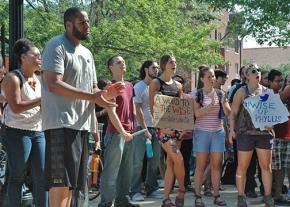Battling the censors at UIUC
reports on a protest in solidarity with fired professor Steven Salaita.
MORE THAN 130 undergraduates, graduate students, alumni and faculty gathered August 26 to protest censorship on the University of Illinois at Urbana-Champaign (UIUC) campus and demand justice for Professor Steven Salaita.
Representatives from Students for Justice in Palestine and the American Indian Studies Program joined many others to add their voices to the tens of thousands across the country demanding justice for Salaita, who was fired before his first day on the job for his recent comments criticizing Israel's treatment of Palestinians in Gaza.
Immediately after Salaita's firing, supporters initiated a support campaign. Scholars around the country recognized that not only was Salaita's firing a clear violation of his First Amendment rights, but it set a very dangerous precedent--that any faculty member could be fired and have their reputations and careers ruined merely for a political disagreement with a university administrator or someone connected with the school power structure.

The possible precedent set by this case is frightening and raises the specter of McCarthyist blacklisting on campus. This is especially true in the case of views around the issue of Palestine, as a battle rages on college campuses around the boycott, divestment and sanctions movement for justice in Palestine.
Chancellor Phyllis Wise and the officials at UIUC have doubled down and defended their decision to fire Salaita. Despite his scholarship and stellar teaching evaluations--all things that usually indicate one's ability to carry out ones job--Wise stated that it wasn't his views on Palestine, but his "civility" that was behind the decision.
This statement exposes Wise for her real motivation for firing Salaita--attempting to silence someone based on their defense of the Palestinian human rights, views she considers "uncivil."
AT THE protest in front of the Swanlund Administration Building in the heart of campus, one protester described how Wise "has effectively silenced our perspectives and values as students on this campus...[and] compromised our scholarly and intellectual communities, threatened our ability to challenge assumptions and to grow as intellectuals."
Other speakers charged that Chancellor Wise cares very little about basic rights on campus, and they called out her hypocrisy for talking about an "inclusive" university as a "community of scholarship that challenges their assumptions about the world" while silencing Salaita's voice.
Students from the American Indian Studies Program (where Salaita would have taught) stated from the front of the rally that her claims of honoring inclusivity are only fodder for a "neoliberal multicultural imagination on campus...that seeks to place diversity on display but not into practice." They said:
The fact that you fail to acknowledge the occupation and the ongoing genocide on Gaza that has resulted in the death of more than 2,130 Palestinians and the injury and dispossession of thousands not only silences Palestinian voices, but also ignores their existence (including those here on our campus), devalues their struggle and perpetuates their repression. This lack of recognition of Palestine from the university debunks the university's claims to political neutrality.
Protesters acknowledged that the university's decision doesn't only affect the American Indian Studies Program, but all disciplines, especially ethnic and gender studies, who "all have a highly politicized history of critiquing racism, sexism and/or imperialism in the U.S. and abroad."
The president of the campus chapter of Students for Justice in Palestine, Ahmad Hamdan, stood before the crowd and spoke about how an e-mail to the chancellor's office from the university's fundraising arm influenced the university's decision. He pointed out the hypocrisy of allowing wealthy donors to dictate hiring and firing decisions and determine the intellectual life of the campus, and asked, "What's the biggest donation this university gets? Our tuition!" Chants of "Whose university? Our university!" followed.
In between the speeches, chants of "Censorship? Not in our name!" and "What do we want? Steven Salaita! When do we want him? Now!" echoed louder and louder.
Near the end of the rally, Andrew Assad, a master's graduate in computer science, said that he was disgusted with the university's blatant racism, and he no longer wanted to "be affiliated with this university." He said UIUC's decision was an embarrassment, and he "de-graduated" himself by tearing up his masters diploma in protest.
Students had prepared a list of grievances and demands and marched into the building to deliver them to a member of Chancellor Wise's staff, since the chancellor and provost were nowhere to be found on campus. They demanded an appointment with the chancellor, whose staffer claimed they couldn't "do that at this time."
The students of UIUC said they would not stop until Professor Salaita is reinstated and discussed plans to occupy the chancellor's office until he is. This fight will require more protests and actions to build solidarity on our campuses, workplaces and unions to fight these attacks on free speech across the country.


